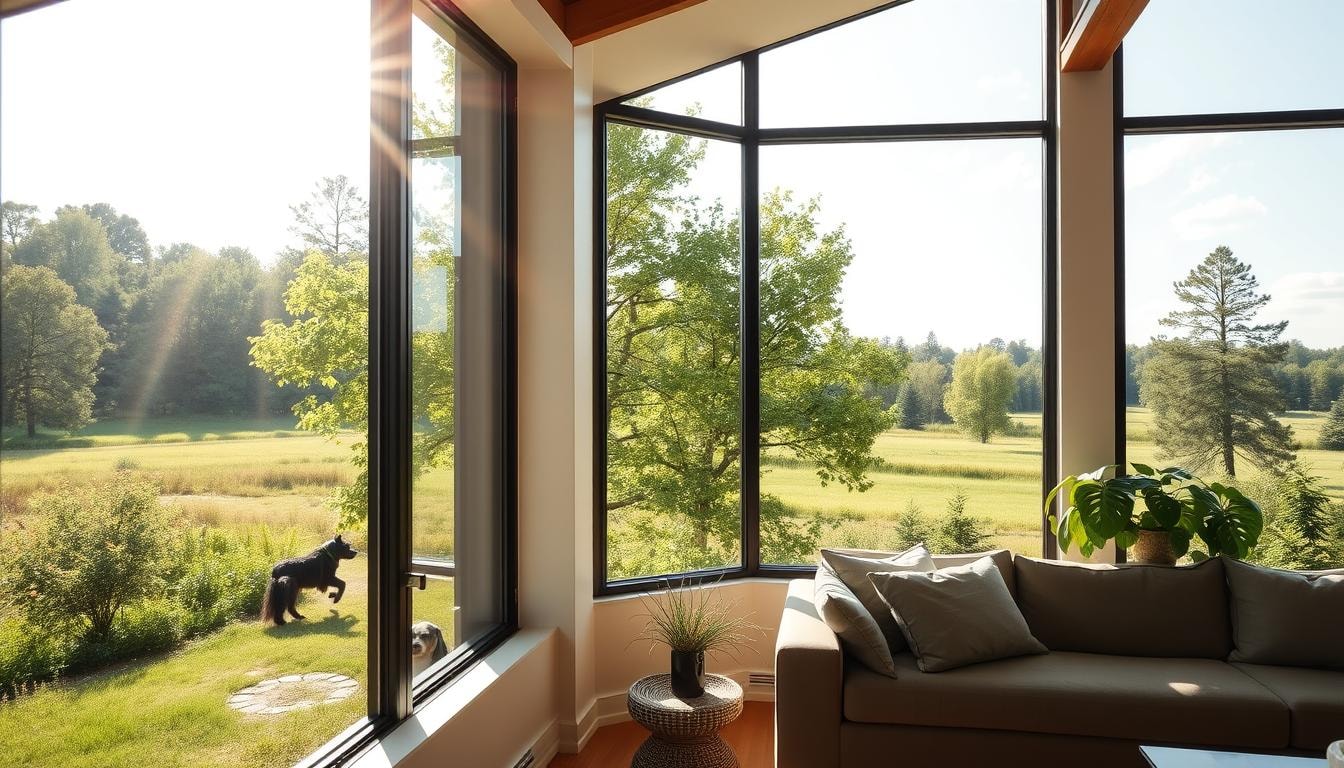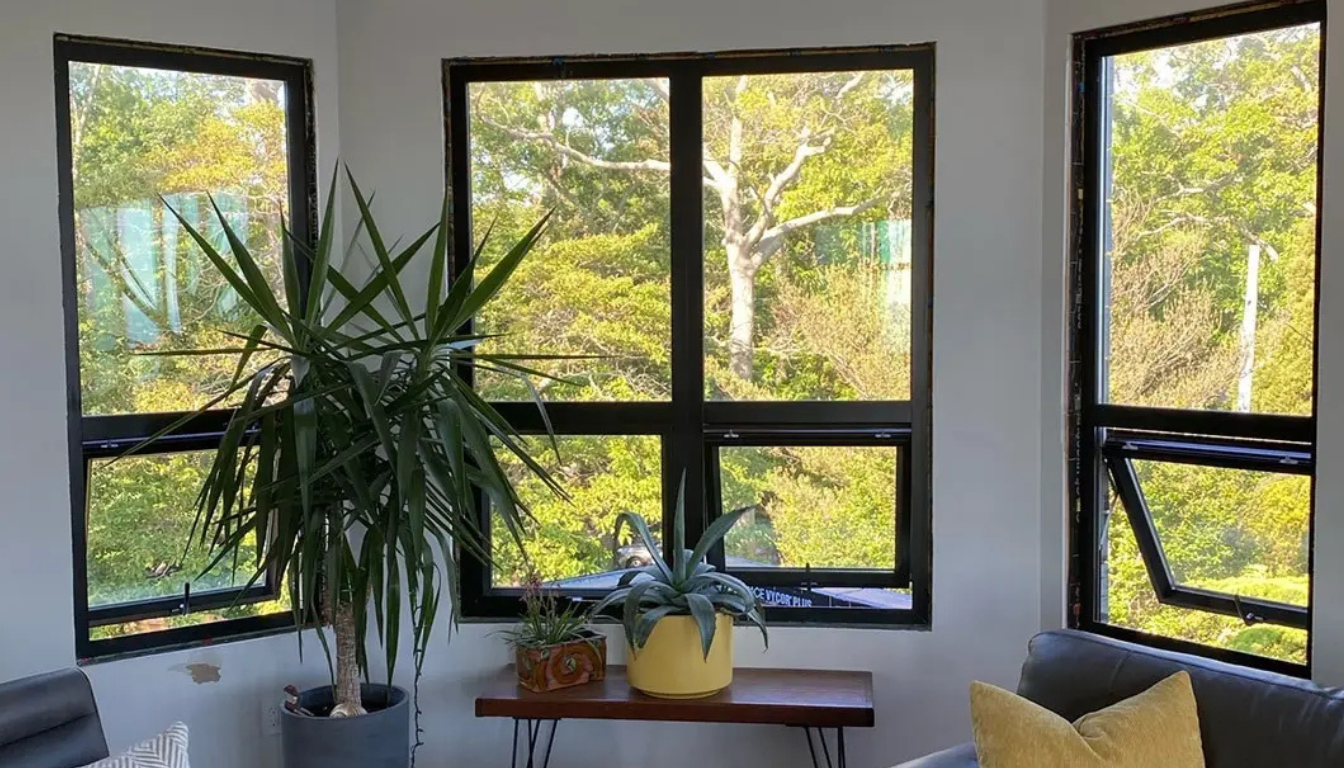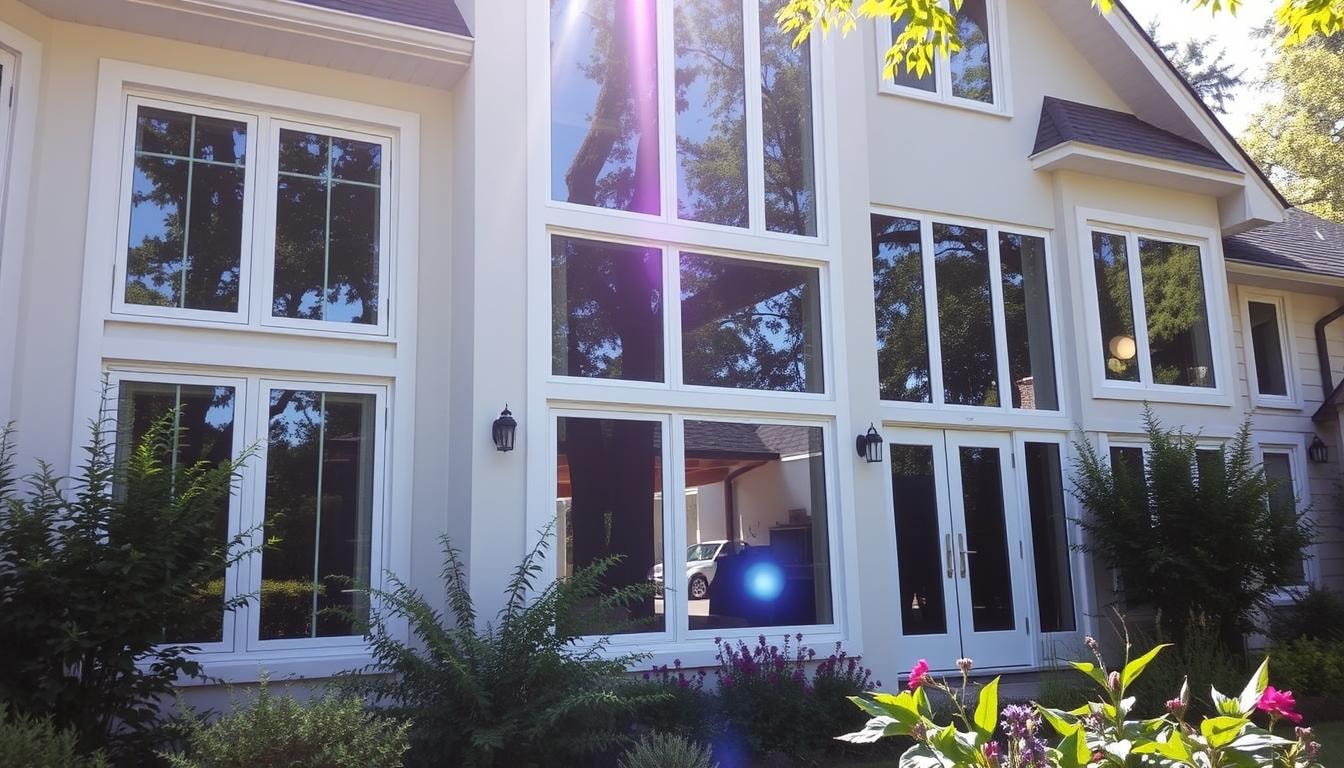
How to Choose the Right Replacement Windows: A Guide for Homeowners
Replacing your home’s windows is a big deal. It can really change how your home feels and looks. You need to think about things like style, how well they keep energy in, and how much they cost.
This guide will help you figure out what’s best for your home. We’ll look at important things like style, energy use, and cost. This way, you can choose windows that fit your needs and taste.
Key Takeaways
- Energy-efficient windows can save households 7-15% on energy bills.
- ENERGY STAR-certified windows are rated for their ability to block heat, cold, and UV rays.
- Replacement windows offer long-term cost savings and enhanced home security and comfort.
- Window styles, materials, and energy efficiency features should be carefully evaluated.
- Professional installation and warranties are crucial for ensuring optimal performance and longevity.
Understanding the Basics of Replacement Windows
Getting new windows for your home is a big deal. It’s important to know the difference between new construction and replacement windows. Replacement windows fit into your current frame, making the change smooth and less messy. New construction windows, on the other hand, are put in when a house is being built, needing a whole new frame.
Window Anatomy and Basic Terminology
Knowing the parts of a window helps you choose better. The frame holds the window in place. The sash holds the glass, and the glass is what you see. Many replacement windows have double pane glass filled with argon gas. This makes them more energy efficient than old single-pane windows.
Benefits of Window Replacement
Getting new energy efficient windows can really help your home. They make your home use less energy, which lowers your bills. You’ll also feel more comfortable and your home will look better. Plus, new window frame can increase your home’s value, making it a good investment.
Common Window Styles and Their Applications
Homeowners have many window styles to pick from. Each style has its own features and uses. Let’s look at some common window styles and where they’re used.
Double Hung Windows: Double hung windows are very popular. They have two sashes that slide up and down. This style is great for homes in the Eastern United States.
Casement Windows: Casement windows open out like a door. They offer great views and air flow. These windows are often seen in modern homes.
- Slider Windows: Slider windows don’t stick out. They slide open and are common in the West.
- Bay and Bow Windows: These windows stick out and bring in lots of light. They add beauty and make rooms feel bigger.
- Picture Windows: Picture windows are big and fixed. They show off views without opening. They’re perfect for beautiful views.
Choosing a window style depends on your home and needs. Knowing about each style helps you pick the best one. This choice can make your home look better, work better, and save energy.
Window Frame Materials: Comparing Your Options
Choosing the right window frame material is key. It affects cost, energy use, and how your home looks. You can pick from vinyl, wood, fiberglass, or aluminum. Each has its own good points and things to think about.
Vinyl Windows: Affordability and Durability
Vinyl windows are loved for being cheap and easy to care for. They last long and keep your home warm or cool well. Good vinyl windows can cut your energy bills by 15%.
Small vinyl windows cost $250 to $450. Bigger ones are $475 to $950. But, top-quality vinyl can be as pricey as other materials.
Wood Windows: Traditional Appeal
Wood windows add a classic look to any home. They keep your home warm or cool well. But, they need regular upkeep to stay looking good and working well.
Wood window prices vary a lot. Simple designs are cheaper, while fancy ones cost more.
Fiberglass and Aluminum Options
Fiberglass windows are strong and save energy. They cost more than vinyl but last longer. A medium-sized fiberglass window is $500 to $1,250.
Aluminum windows are light and cheap but use more energy. They can raise your energy bills by 8-10% yearly. A mid-range aluminum window is $400 to $800.
Think about your budget, energy needs, and style when choosing windows. Vinyl is the cheapest, while wood, fiberglass, and aluminum offer different benefits. Knowing the pros and cons helps you pick the best for your home.
Energy Efficiency Features and Ratings
Energy efficiency is key when choosing replacement windows. Look for windows with low-E coatings and inert gas fills. These improve insulation and cut down on heat transfer.
The U-factor shows how well a window keeps heat in. The Solar Heat Gain Coefficient (SHGC) tells you how much solar heat it lets in.
For the best energy savings, choose ENERGY STAR certified windows. They are 15-40% more efficient than regular ones. This can save you a lot on heating and cooling costs over time.
- U-factor measures a window’s insulating ability, with lower values indicating better insulation.
- SHGC indicates how much solar heat a window transmits, with lower values preferred in warm climates.
- Low-E coatings reduce heat transfer and block UV rays while allowing natural light to enter.
- Argon gas fills between window panes provide superior insulation compared to air.
Knowing about these energy-efficiency features helps you choose the right windows. They should match your home’s needs and your local climate.
Key Considerations While Choosing a Window
Choosing the right replacement windows for your home is important. You need to think about your climate zone and your home’s style. Also, your budget is a big factor in picking the best windows.
Assessing Your Climate and Location
Your area’s climate is key when picking windows. Windows for cold areas need better insulation than those for warm places. Knowing your climate helps pick windows that save energy and keep you comfy all year.
Evaluating Your Home’s Architecture
Your home’s style is also important. The right windows can make your home look better. Whether your home is old, modern, or traditional, there’s a window style for it.
Considering Budget Constraints
Cost is a big deal when choosing windows. You want to balance what you spend now with the energy savings later. Looking at prices from different installers and checking for rebates can help find good deals.
Understanding Window Glass Options
Choosing the right glass for your home’s windows is key. It affects how well your home works and saves energy. Let’s look at the different types of glass and what they offer.
Single-pane windows don’t keep heat well. But, double-pane and triple-pane windows do a better job. Double-pane windows have two layers of glass with air in between. This keeps heat in and saves energy. Triple-pane windows have three layers and two air spaces, making them the best at keeping heat in.
In areas hit by hurricanes, impact-resistant glass is a must. It adds extra safety. Low-E glass is also popular. It cuts down on heat and UV damage, making your home more energy-efficient.
- Single-pane windows offer basic glass protection
- Double-pane windows provide better insulation than single-pane
- Triple-pane windows offer the highest level of thermal insulation
- Impact-resistant glass enhances protection in severe weather conditions
- Low-E glass helps reduce heat transfer and UV damage
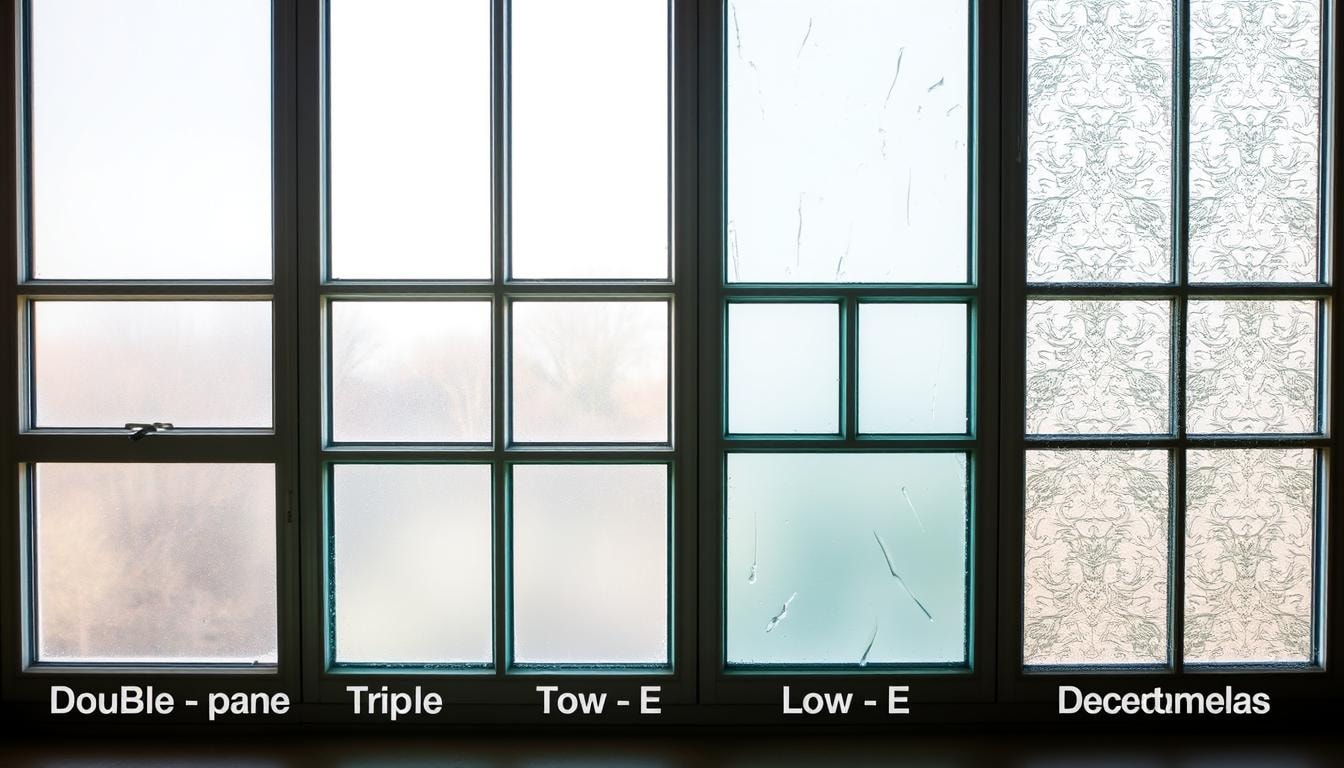
When picking glass for your home, think about your area’s weather and energy goals. Also, consider if you need extra security or to block out noise. Knowing about different glass options helps you choose the best for your home.
Window Measurements and Sizing Guide
Understanding window measurements is key for replacement windows. Standard sizes are common, but custom sizes might be needed for older homes or special designs. Getting the measurements right is crucial for a good fit and performance.
Standard Window Sizes
Common sizes in modern homes include:
- Double-hung windows: 2′ x 3′ (2030), 2′ x 4′ 4″ (2044), 2′ 8″ x 4′ (2840), 2′ 8″ x 5′ 2″ (2852), and 4′ x 6′ (4060)
- Picture windows: 3 ft x 2 ft (3020), 5 ft x 3 ft (5030), 6 ft x 4 ft (6040), 4 ft x 5 ft (4050), and 8 ft x 5 ft 2 in (8052)
- Sliding windows: 3 ft x 2 ft (3020), 3 ft x 3 ft (3030), 5 ft x 3 ft (5030), 6 ft x 4 ft (6040), and 7 ft x 4 ft (7040)
- Casement windows: 1 ft 7 in x 1 ft 4 in (1714), 2 ft 3 in x 2 ft 3 in (2323), 2 ft 9 in x 2 ft 9 in (2929), and 3 ft 5 in x 2 ft 5 in (3525)
- Awning windows: 3 ft x 2 ft (3020), 4 ft x 2 ft 4in (4024), and 5 ft x 3 ft (5030)
Custom Sizing Considerations
Custom sizes might be needed for older homes or special designs. It’s best to work with a professional to measure your windows. This ensures the new windows fit perfectly and work well.
Professional Installation vs. DIY Considerations
Homeowners have to choose between professional installation and DIY window replacement. DIY can save money, but it’s important to think about the risks and benefits.
Professional installation means your windows will fit right and you’ll have warranty coverage. DIY installation can make the warranty invalid. This means you could have to pay for any problems yourself. Professionals ensure your windows work well and keep the warranty valid.
- DIY window replacement risks voiding the manufacturer’s warranty, as most warranties require professional installation.
- Handling glass or working at heights during DIY installation can lead to serious injuries, highlighting the safety risks involved.
- Proper installation by professionals ensures energy-efficient windows function optimally, leading to reduced energy consumption and lower utility bills.
DIY window replacement might save money, but it’s not without challenges. Homes built before 1978 need special care for lead paint. The project’s complexity is also a factor. Homeowners should think about their skills and the project’s scope before choosing DIY.
The choice between professional installation and DIY depends on many things. These include your skills, the project’s complexity, and the benefits of professional work. By considering these factors, homeowners can make a choice that fits their budget and preferences.
Window Warranties and Guarantees
When choosing replacement windows, the warranty and guarantees are key. These cover the product, glass unit, and installation. They give homeowners peace of mind and protect against problems.
Manufacturer Warranties
Look at the manufacturer’s warranty when picking windows. Good brands offer warranties lasting at least 10 years. Some even go up to 20 years. These warranties protect against defects in materials and workmanship.
Installation Warranties
Don’t forget the installation warranty. Most installers offer a warranty on their work. This usually lasts 5 years or more. It covers any installation issues, adding extra security.
Glass Unit Coverage
The glass unit in your windows is important. Many manufacturers have specific warranties for it. These often last at least 10 years, covering fogging or condensation issues. A strong glass unit warranty is essential for your investment.
Knowing about the warranties and guarantees for replacement windows helps you make a smart choice. It ensures your home is protected for the long term.
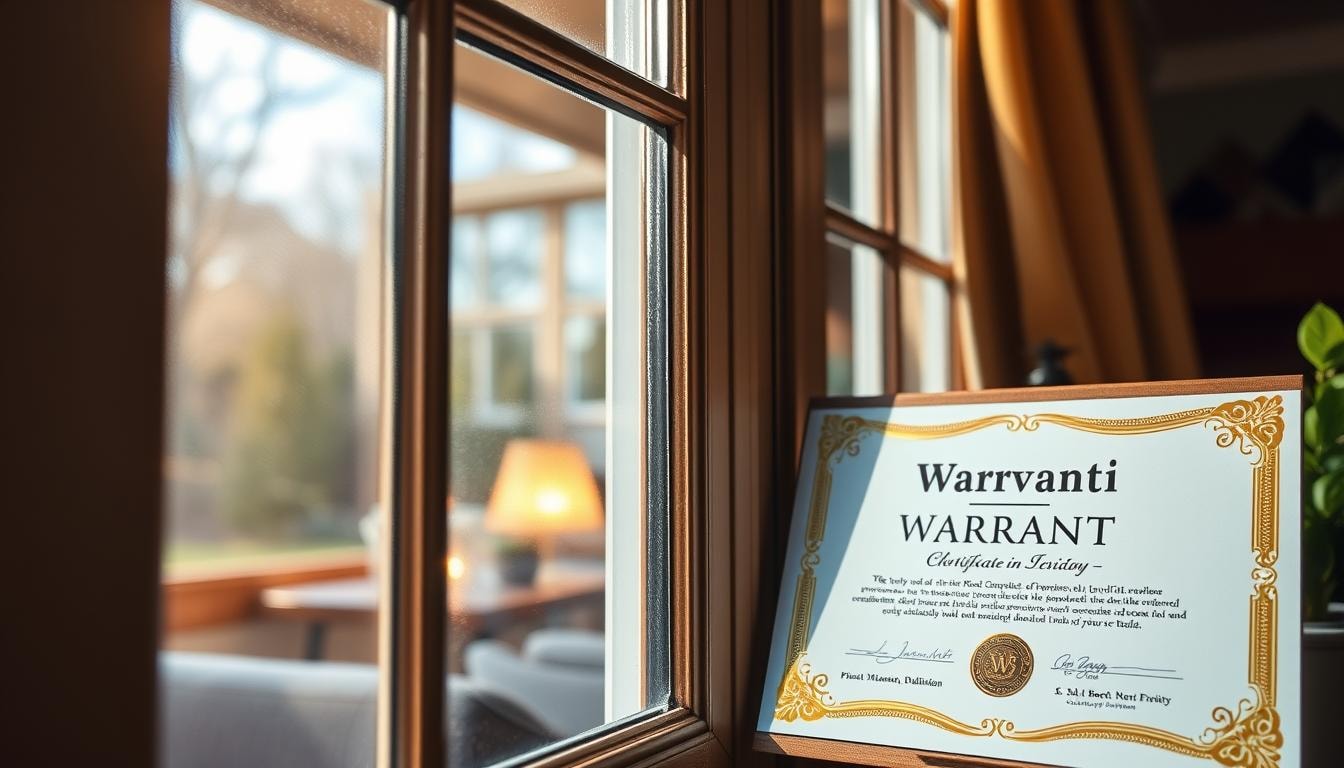
Maintenance Requirements and Long-term Care
Keeping your windows in good shape is key for their long-term performance and energy saving. The upkeep needed depends on the window frame material. Vinyl windows need little care, while wood windows might need painting or staining often.
Proper cleaning and care can make your windows last longer. Regular checks and fixing problems fast can stop small issues from getting big. Look for drafts, condensation, or wear and tear. Choosing easy-to-clean windows is also smart.
- Vinyl windows: Require minimal upkeep, making them a popular choice for homeowners.
- Wood windows: Need regular painting or staining to maintain their traditional appeal and protection.
- Fiberglass windows: Recognized for their strength and energy efficiency, providing a durable and efficient option for window replacement.
Good window care includes tasks like oiling moving parts and checking seals. You should also fix any problems right away. Different seasons might need special care, like checking for drafts in winter and cleaning in summer. Keeping up with window care ensures they work well and save energy for a long time.
It’s important to clean and check your windows often. Fixing problems quickly helps keep them working well and saves energy. This way, your windows will last longer and work better.
Upgrade with Budget Windows
Are your old windows letting in the cold air and driving up your energy bills? It’s time to upgrade with Budget Windows. Our expert team can help you find the perfect replacement windows, from energy-efficient triple pane glass to stylish bay windows. We offer a wide selection of vinyl frames, composite windows, and other top-quality features to meet your needs and budget. Not all windows are created equal, so let us help you compare options and find the best solution for your home.
With our installation guarantee and competitive pricing, upgrading to new windows has never been easier. Contact Budget Windows today and let our team of window experts transform your home with better insulation, reduced sun heat, and easy cleaning. Say goodbye to drafts and interior heat loss – upgrade to the windows you deserve with Budget Windows.
Conclusion
Choosing the right replacement windows is key for a better home. It boosts energy efficiency and comfort. It can also raise your home’s value.
There are many styles, materials, and features to pick from. Researching and talking to experts helps you make a good choice. This choice should fit your needs and budget.
Energy-efficient windows, like Energy Star certified ones, save up to 12% on heating and cooling. They’re a smart pick for a greener, cheaper home upgrade. Also, picking the right materials, like vinyl, wood, or aluminum, adds beauty and durability to your home.
Think about your climate, home design, and budget when choosing windows. The right windows make your home look great and keep it cozy. Working with trusted window companies ensures a smooth install. They offer strong warranties for a worry-free upgrade.
FAQs
What are the key benefits of replacing my existing windows?
Replacing your home’s windows can provide several benefits, including improved energy efficiency, enhanced home comfort, and increased property value. Energy-efficient windows can save households 7-15% on energy bills by better regulating indoor temperatures and blocking UV rays.
What window frame materials should I consider, and how do they compare?
The most common window frame materials are vinyl, wood, fiberglass, and aluminum. Vinyl windows are affordable and durable, while wood offers traditional appeal but requires more maintenance. Fiberglass is strong and energy-efficient, and aluminum is lightweight but less insulating. Consider your budget, energy needs, and home’s style when choosing the right frame material.
How do I ensure I select the most energy-efficient windows for my home?
Look for ENERGY STAR-certified windows, which are rated for their ability to block heat, cold, and UV rays. Windows with low-E coatings and argon gas fills between the panes provide superior insulation compared to single-pane or older double-pane windows. Knowing the U-factor and Solar Heat Gain Coefficient (SHGC) can help you pick the most energy-efficient options for your climate.
What are the key considerations when choosing between custom replacement windows and standard sizes?
Standard window sizes are common in modern homes, but custom sizing may be required for older homes or special designs. Working with a professional to accurately measure your existing window frames is crucial to ensure a proper fit and optimal performance. Custom windows can accommodate unique home features like bay or bow windows.
How important is professional installation for replacement windows, and what are the risks of DIY installation?
Professional installation is highly recommended, as it ensures your new windows are properly sealed and integrated with the existing frame. DIY installation can void the manufacturer’s warranty, leading to potential issues and extra costs down the line. Professional installers also have the expertise to handle the windows safely and mitigate any risks, such as lead paint concerns in older homes.





